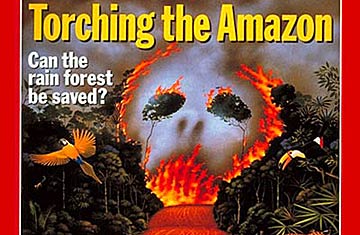
(7 of 9)
This courageous leader did not set out to save the Amazon but to improve the lot of rubber tappers, or seringueiros. He and his men would try to dissuade peasants from clearing land. The ranchers were eager to get rid of him, but he survived one assassination attempt after another. The conflict finally came to a head last year, when Mendes confronted a rancher named Darli Alves da Silva, who wanted to cross land claimed by rubber tappers to cut an adjacent 300-acre plot. After Mendes and a group of 200 seringueiros peacefully turned back the rancher and 40 peons, death threats against him grew more frequent. In December he was killed with a shotgun as he stepped out of his doorway. Alves and two of his sons were convicted of the murder but have appealed the verdict.
Mendes became a hero to environmentalists not only because he fought and died to stop deforestation but also because of the way of life he was defending. The rubber tappers are living proof that poor Brazilians can profit from the forest without destroying it. According to Stephan Schwartzman of the Environmental Defense Fund, seringueiros achieve a higher standard of living by harvesting the forest's bounty than do farmers who cut the forest and plant crops.
One of Mendes' most important achievements was to help convince the Inter- American Development Bank to suspend funding temporarily for further paving of BR-364 between Rondonia and Acre. But the Brazilian government is again seeking the $350 million needed to complete the road all the way to Peru, a prospect that alarms environmentalists. "One lesson we have learned in the Amazon is that when you improve a road, you unleash uncontrolled development on the rain forest," says John Browder, a specialist on Rondonia's deforestation from Virginia Polytechnic Institute.
Among other things, environmentalists fear that completion of the road will provide entree for Japanese trading companies that covet the Amazon's vast timber resources. Acre's governor, however, argues that the road is needed to end the state's isolation and claims that the state will not repeat the mistakes of Rondonia.
The debate over the Acre road places environmentalists in an uncomfortable position, essentially telling Brazilians that they cannot be trusted with their own development. Raimundo Marques da Silva, a retired public servant who helped build Acre's original dirt highway, asks, "How would Americans feel if years ago we had told them they could not build a road from New York to California because it would destroy their forests?"
Still, some Brazilians do accept that the outside world has a legitimate interest in the Amazon. Jose Lutzenberger, an outspoken environmentalist, notes that the Brazilians trying to develop the rain forest are themselves outsiders to the area. "This talk of 'We can do with our land what we want' is not true," he says. "If you set your house on fire it will threaten the homes of your neighbors."
